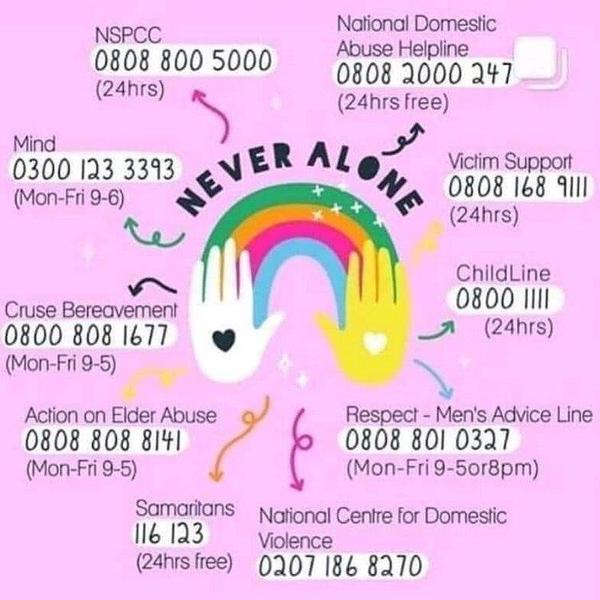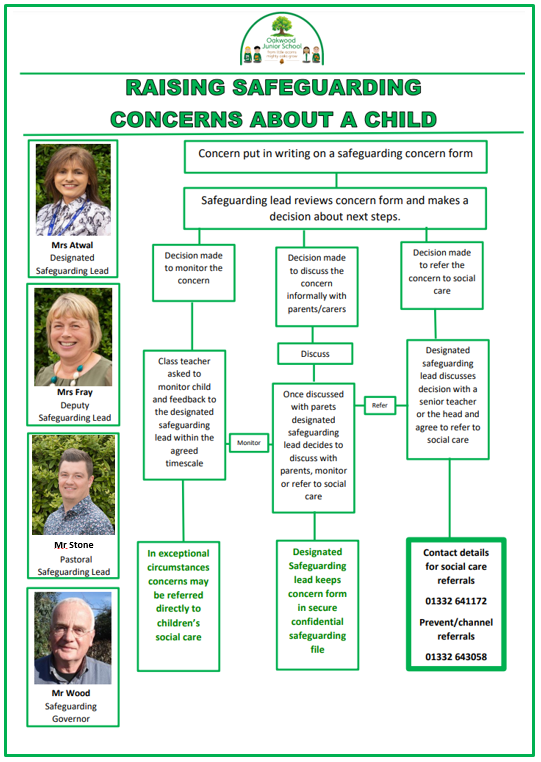If you have any concerns, would like more information or would like to speak to a member of our Safeguarding team, please do not hesitiate to contact us by phone or email, or by using the form on our CONTACT US page of the website.
Safeguarding
'It could happen here. Safeguarding is everyone's business.'
AT OAKWOOD JUNIOR SCHOOL WE UNDERSTAND THAT SAFEGUARDING IS EVERYONE’S RESPONSIBILITY. ALL MEMBERS OF STAFF THAT WORK IN OUR SCHOOL RECEIVE REGULAR AND ONGOING SAFEGUARDING TRAINING.
This covers all areas in the DFE document, ‘Keeping Children Safe In Education‘ – (updated September 2023) including the Prevent Strategy, FGM and Child Exploitation.
The school has robust procedures that record issues relating to child protection and we follow the Derby & Derbyshire Safeguarding Children Partnership (DDSCP) procedures. We work with an array of agencies including Children’s Services, the School Nurse and the Police which includes ‘Operation Encompass’.
OAKWOOD JUNIOR SCHOOL SAFEGUARDING CHILDREN STATEMENT:
‘It could happen here. Safeguarding is everyone's responsibility’.
The Health and Safety of all children is of paramount importance. We recognise our moral and statutory duty to safeguard and promote the welfare of all children. We make every effort to provide an environment in which children and adults feel safe, secure, valued and respected.
Our staff are trained to look out for signs of abuse or neglect and have a professional curiosity. Staff are required to report concerns to the safeguarding leads who follow clear procedures to ensure children receive effective support.
Further information is contained within our Safeguarding policy which can be found at the top of the page.
VETTING PROCEDURES:
All members on the school staff have a DBS check (Disclosure and Barring Service) in order to work in school and checks are carried out before they begin employment. This is regardless of the employee’s role. In addition, all volunteers and anybody else who has regular contact with children are also checked. Visitors to the school either provide their own DBS on arrival or are members of professional bodies who are registered by their employer, such as OFSTED inspectors or Local Authority Employees. Any one-off visitor, such as a visiting author provides their own DBS.
RISK ASSESSMENTS:
Whilst we cannot remove risk, we look at ways of minimising risk. Risk assessments are undertaken across all aspects of the school, playground and the car park. We carry out risk assessments for all school trips including residentials. Risk assessments may be carried out for individuals who require some reasonable adjustments to support their learning and behaviour.
EQUALITY:
The school has an Equality policy that monitors any possible discrimination in the school in relation to any of the nine protected characteristics (Equality Act 2010). The School also keeps records of any racist incidents.
If you or your child is worried about anything, please do contact the school. You can speak to our designated safeguarding lead (Mrs Atwal), or any member of staff.
If you would like some advice on how to keep your child safe please see:
NSPCC: E-mail or telephone: 0808 80050000
NSPCC Underwear Rule:
See also the NSPCC online leaflet "Simple Conversations to help Keep your Child Safe" with advice on talking to your child about keeping safe from abuse.
CHILDLINE: Telephone: 08001111
PACE: (Parents against child exploitation) Tel: 0113 240 3040
Thinking of leaving your child at home?
Law on leaving your child home alone (Gov.uk)
ONE IN FOUR: (Advocacy service, counselling service and information service for those who have experiences sexual abuse.)
CEOP: Child Exploitation and Online Protection
The government has a useful website for parents called Educate Against Hate which will give you access to free information and resources to support staff and parents about identifying and addressing the risks as well as build resilience to radicalisation. https://educateagainsthate.com/parents/
Disclosure
If a child discloses information about significant harm you should:
Listen: Tell the child that you need to tell someone else. Remember you cannot promise confidentially.
Make Notes: Accuracy is important. Make notes of what has been said by the child and pass this immediately to the Designated Safeguarding Lead.
Report: Please remember, it is not your responsibility to investigate but to report to the Designated Safe- guarding Lead.
If there is any reason to suspect that a child has suffered bullying or discrimination, or is likely to suffer significant harm, you must inform the Designated Safeguarding Lead immediately. Our staff will then follow the procedures according to the school Safeguarding Policy.
Contact Information
Designated Safeguarding Lead: Mrs Atwal
Deputy Safeguarding Lead:
Mrs Fray
Safeguarding Governor:
Mr Wood
Pastoral Safeguarding Lead
Mr Stone
(t): 01332 571231
(e): admin@oakwoodj.odysseyct.org.uk
(e): head@oakwoodj.odysseyct.org.uk


Visiting the School Building
It is important that you sign in on arrival and collect your lanyard from the office. Please wear the lanyard at all times to avoid being challenged by staff or pupils.
Please remain with your host at all times unless we confirm we have had prior DBS clearance for you. On departure please sign out and return your lanyard.
As a visitor to our school, either as a contractor, volunteer, supply teacher or someone that has come to work with our children in any capacity, it is important that you are aware of our safeguarding procedures.
Working with children
We hope that you have an enjoyable visit to Oakwood Junior School. Our main priority is to ensure that everyone who visits is aware of their responsibilities towards making sure all children are safe. As a visitor please remember:
If you are working in a 1:1 situation in an isolated area with a student, we must have confirmation that all the necessary safeguarding checks have been carried out including the Enhanced DBS disclosure.
You must not have any physical contact with any child.
You must never exchange personal contact details with a child or arrange to meet them outside of the school environment.
Helpful Websites
Please take a look at some of the following websites that support parents and carers to keep children safe online :
Internet matters - for support for parents and carers to keep their children safe online
London Grid for Learning - for support for parents and carers to keep their children safe online
Net-aware - for support for parents and careers from the NSPCC
Parent info - for support for parents and carers to keep their children safe online
Thinkuknow - for advice from the National Crime Agency to stay safe online
UK Safer Internet Centre - advice for parents and carers
Other Information
Fire and emergency evacuation: If the fire alarm sounds, please leave the building immediately by the nearest exit and assemble on the playground. Our staff will direct you to report to the assembly point.
First Aid: Please ask at the office if you need assistance.
Accidents and Incidents: Please report these to the office.
Use of mobile phones: Mobile phones must be switched off. They can only be used in the staffroom or the school office.
Parking and Disabled Access: Limited parking is available in our car park, but spaces can be reserved if necessary. The building is fully accessible.

NSPCC
Help for adults concerned about a child
Call us on 0808 800 5000
Access the helpline through SignVideo
Help for children and young people
Call Childline on 0800 1111
Access Childline through SignVideo
What is a trusted adult?
Trusted Adult Primary SaferSchools (updated)
WHAT IS ABUSE? Any form of neglect, physical, emotional or sexual mistreatment or lack of care that leads to harm or injury. It can happen to any child regardless of their age, gender, race or ability.
WHAT IS DISCRIMINATION? When people receive less favourable treatment in and grounds which cannot be justified. This covers race, ethnic or national origin, language, religion or belief, gender, gender reassignment, sexual orientation, disability, social class, responsibility for other dependent or where the person lives.
WHAT IS BULLYING? A wilful, conscious attack on the self-esteem or the person of an individual student. It includes jibes, name-calling, silence/exclusion from the social circle, emphasising differences, threatening behaviour, racial/sexual harassment, extortion and physical attack. It may vary in severity, frequency and in the numbers of people involved.
People working in schools are uniquely placed to notice signs and symptoms of abuse and to support children who are subject to abuse or living in abusive situations.
